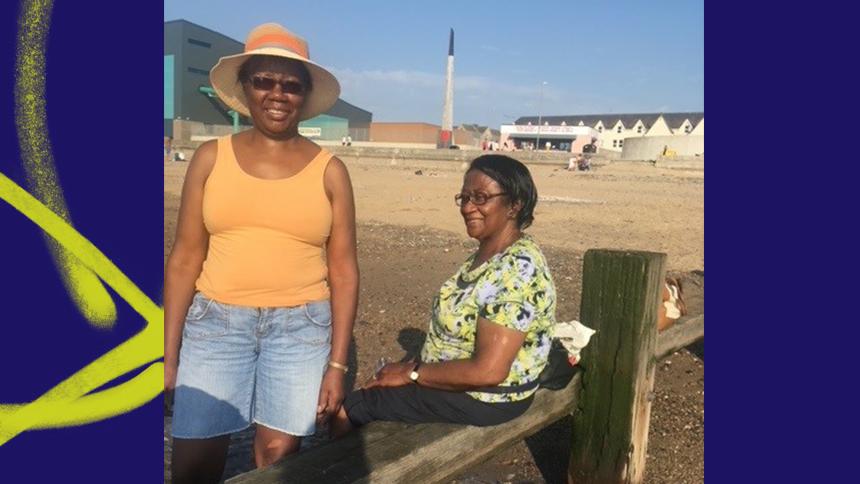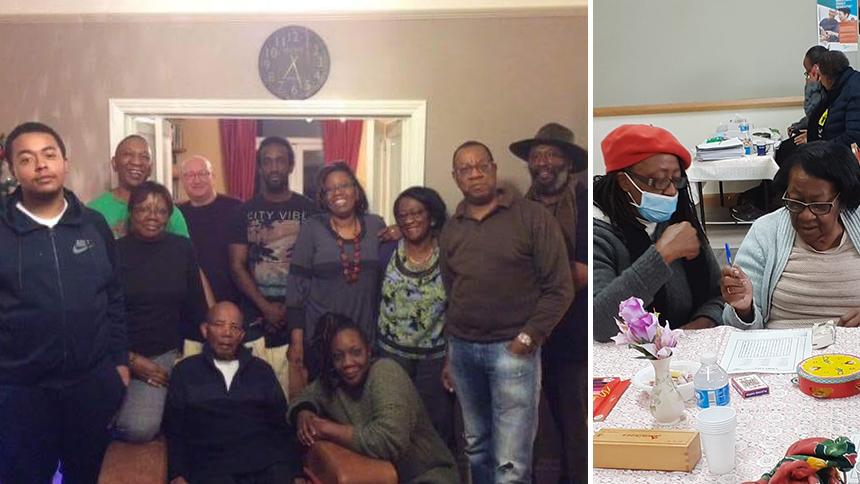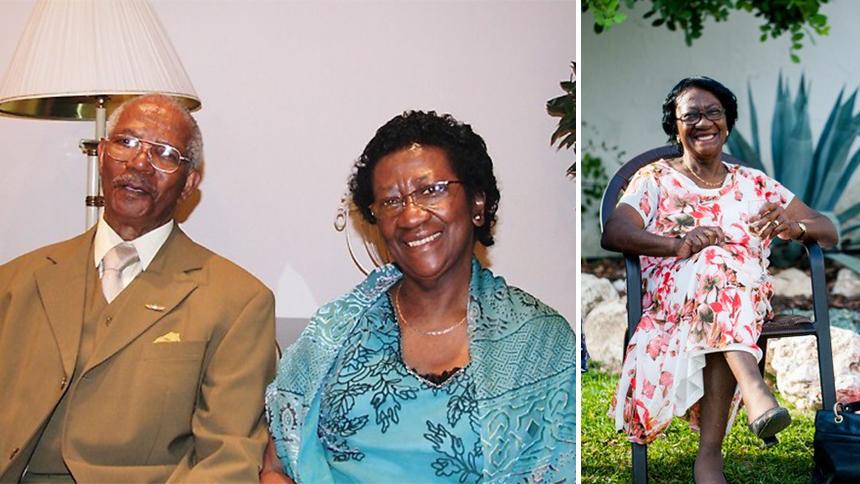Facing tough decisions about a person’s care as their dementia progresses
Nova is under great strain as her family strives to support her mum as they prepare for the next stage of her care.
‘It’s challenging, deciding what to do when your parents develop a long-term illness and balancing this with work and your own personal wellbeing,’ says Nova, whose 84-year old mum Doris was diagnosed with Alzheimer’s in late 2019.
With their mum’s care needs increasing, Nova and her siblings are turning to more outside help as they strive to decide what is best for Doris.
‘It’s been a very difficult time, a strain for us all, and her situation is getting worse,’ says Nova who, like the others, has been juggling her mum’s care with her own work commitments.
‘When our dad had dementia, Mum had to give up many of her voluntary community commitments. Mum’s wellbeing is the main priority but we’re trying to live our lives as well, because we know it’s what she would have wanted.’
Nova is calling for better support for people who are caring for someone with dementia.
‘More needs to be done in terms of fairer financial support, so that family carers are able to have a better quality of life.’

Strong-minded
Doris, a great-grandmother who turns 85 in May, came to England from Jamaica in 1960, a year after her husband. Nova was still a baby and didn’t join her parents in the country until she was seven. Doris worked as an auxiliary nurse, including night shifts at what was then a children’s hospital in Wolverhampton, in the West Midlands.
‘My parents were both very hardworking,’ says Nova, who lives in Wolverhampton.
‘Mum was feisty and very strong-minded – she stood her ground. She was also very family orientated, a typical Jamaican woman.’
Even after her retirement, Doris was very active in the community. She ran an Age Concern club and was a member of local transportation and hospital boards. She was a retired member of Unison, the union, and actively involved with her Methodist church.
Not safe
Now semi-retired, Nova worked abroad for 20 years, during which time her dad died with dementia. She returned to England in April 2019 and started to see changes in her mum’s behaviour.
‘I was noticing things she was doing that weren’t safe,’ says Nova. ‘I came back one afternoon and she’d put a ready meal in the oven still in the paper carton.
‘Another time she had been given a portable stove because of work going on at the house, but she was cooking something that would have caught fire.’
Having also become very repetitive with her questions, Doris saw the doctor in October 2019, before taking a test at the memory clinic the following month. This led to a diagnosis of Alzheimer’s.
During the first COVID lockdown, Doris’s levels of confusion increased.
‘Mum became verbally aggressive towards me, which frightened me,’ says Nova. ‘She was also not recognising some of her siblings.’
On one occasion Nova called an ambulance because she thought her mum was having a stroke, which turned out to be delirium. Doris also lives with chronic back pain and cornea problems.

Daunting and sad
With day centres closed because of the pandemic, Nova was feeling the pressure of having to be there continuously for her mum. So the family employed a carer to spend time with Doris during the day, while Nova and her siblings took turns to go in the evening and stay the night with Doris.
‘Mum developed sundowning, saying it’s not her house. She kept wanting to go back to where I used to live, or go and see her mother,’ says Nova, who received support and advice on these challenges from Anuja Jalota, Dementia Support Worker at Alzheimer’s Society.
With the easing of the pandemic restrictions, the family support Doris to attend a day centre, where she enjoys being around other people. However, many challenges remain, and Doris’s level of need is high.
‘She can be in a foul mood and doesn’t want to go to bed some days,’ says Nova. ‘If you speak to her, she’s quite lucid, but she needs 24/7 support, including personal care, as there are many things she cannot do herself.
‘Caring for Mum is daunting and sad, and we all have to work as well.’
Too much
Additional support from a visiting relative allowed Nova to have a few weeks’ holiday. Since her return, the family is trying to decide on the best longer-term support for Doris.
Doris is on a six-month waiting list to have her home assessed for potential adaptations, while another concern is the high cost of homecare.
‘It’s at least £1,000 a week,’ says Nova, who is also critical of how little care workers are paid.
‘What the staff get paid, compared to what we’d have to pay the company, isn’t fair,’ she says. ‘To get good care workers into the profession, they should be valued more.’

To the fore
Nova believes there are lots of other families in a similar situation and she wants the government to improve the social care system.
‘People will be torn, having to weigh up the care of a person with dementia with the cost of a care home.
‘People are living longer and something needs to be done,’ she says.
‘They need to come up with a strategy, like a scheme which people pay into to cover their costs when they get older.’
And as she prepares for this new stage in her mum’s care, Nova would also like to see better support for families, greater investment in dementia research and more information about dementia prevention.
‘It seems like every other person we hear of has dementia – it’s worrying,’ she says. ‘Dementia needs to be brought to the fore, even more.’
How can you help?
£9.90 could provide someone’s first conversation with one of our telephone advisors.


Brian Witcombe
saysHear, hear to both the article and the comments.
Jules
saysI have been struggling more or less on my own too look after my mom who has dementia , heart failure and diabetes, I am now suffering from stress and exhaustion and rang social services to try carers once a day to give me a break. The 6 week trial started last Monday . The first agency social services wanted me to use I rejected as reviews were abominable but better on the 2nd but it has been a nightmare - was promised 2 carers mon - Fri 5.30-6.05 just to do tea , give her squash and ensure pills taken , had different carers 3 days running , carers not turning up , not wearing PPE and arriving more than half hour late which isn’t good when mom is asking for her food , she’s hungry , have stayed at moms to see how she gets on with carers , it’s a good job I did or she wouldn’t have eaten some evenings!!
I am worn out but my 2siblings don’t help at all , my daughter , niece and granddaughter help hop skip and a catch , I can’t trust the care agency/ carers and mom point blank refuses to go into a home so what do you do ?
Hi Jules,
We're very sorry to hear about your mom's experience with the care agency and that you've been feeling stressed and exhausted.
Please call our Dementia Connect support line on 0333 150 3456 and speak with one of our trained dementia advisers. They will be able to learn a bit more about your situation and give information, advice and support that can help you.
You can read more about the support line (including opening hours) here:
https://www.alzheimers.org.uk/dementia-connect-support-line
We hope this is helpful.
Alzheimer's Society website team
Peter Garside
saysI can sympathize with your situation & how to cope daily as well as have respite care so you can recharge the batteries & keep going long term.
Although a well kept secrete NHS invented Continuous Healthcare (CHC) years ago to enable people to nurse their loved ones in their own homes with the cost of professional care paid by NHS.
Obtaining CHC requires a complex situation daily in addition to a diagnosis of Alzheimer's Disease. To find out if your situation is likely to be eligible please look at my website at https://continuinghealthcare.wordpress.com/
I successfully got this tax free benefit but had to Appeal against an initial refusal. Funding for CHC seems to be totally inadequate which leads directly to bed blocking in our hospitals as people can not cope alone & families are unable to provide care 24/7.
Hope you find success via this route as Social Care is very expensive via Local Government imposing a financial penalty on the public for getting a long term illness. Our NHS is funded to look after our health needs but seems to be run to look after the needs of its staff not the public.
Best wishes.
Peter Garside
Hi Peter,
Great to hear from you again. We hope you're well.
Getting a diagnosis of any type of dementia unfortunately does not carry automatic eligibility for CHC. As much as we would like it to be, eligibility for CHC funding is never ’condition specific’. It relies on identifying the person’s needs in line with the criteria laid out by the Department of Health.
At Alzheimer’s Society, we suggest that the best way for people to access NHS Continuing Healthcare (CHC) if they think they are eligible or they represent someone who they think is eligible, is to inform themselves fully of the CHC criteria before the process starts.
We recommend visiting our page on 'Tips on preparing your case for NHS continuing healthcare' (https://www.alzheimers.org.uk/get-support/help-dementia-care/nhs-contin…) or downloading our free booklet for further information.
Best wishes,
Alzheimer's Society blog team
Angie
saysNova is lucky to have siblings that help out. My sister thinks her once a month visit is doing her bit and get annoyed when I tell her I need more support. As for leading your own life, good luck with that. Something always happens. My last attempt was Easter weekend, when despite now having carers 5 times a day, the only way to manage my mum's antibiotics were for me to come in mid-afternoon. So bang goes that volunteering at a local animal sanctuary open day. I am pleased that shops are always open for carbs and alcohol.
Alzheimer's Society
saysHi Angie,
We're sorry to hear this. It sounds like you might benefit from joining our online community, Talking Point, where people affected by dementia can share their experiences. You can browse the conversations within the community or sign up for free here: https://forum.alzheimers.org.uk
If you ever need advice, information or support, you can always call our Dementia Connect support line on 0333 150 3456 to speak with one of our trained dementia advisers. You can find more details about the support line (including opening hours) here: https://www.alzheimers.org.uk/dementia-connect-support-line
We hope this helps, Angie.
Alzheimer's Society blog team
Jules
saysKnow how you feel Angie I am in the same boat myself
Debbie Pugh
saysThis resonates with me so much. I work full time and trying to juggle arrangements for my mum is really hard. For me a starting point would be a care pathway for each person with dementia. I don’t understand why we as family have to spend so much time working out how to access support . When my son had cancer everything worked seamlessly - I didn’t have to worry about how his care and treatment was going to be arranged. Why do people with dementia get treated differently? It’s a brain disease after all
Denise
saysDebbie you are so right. A diagnosis is all you get, the rest is a minefield that you have to sort out yourself, we are not talking about a few months either this degenerative illness can be something the person and their carers have to cope with for a number of years. There should be a lot more help...
David H
saysHi Denise and Debbie ,you are quite right, I new my wife was going down the dementia road eight years ago but decided that we needed to to what we could do before we asked for a diagnosis as I realised that there is no real help and things will only get worse finally got the diagnosis four years ago, the money helps to take away some of the financial anxiety , I now am tied to the house as my lovely wife is now house bound. I do get carers in to help with washing in the mornings and 2 hours respite care twice a week.
It is very hard at times, friends have disappeared and I miss having a conversation, you can be lonely in a crowd.